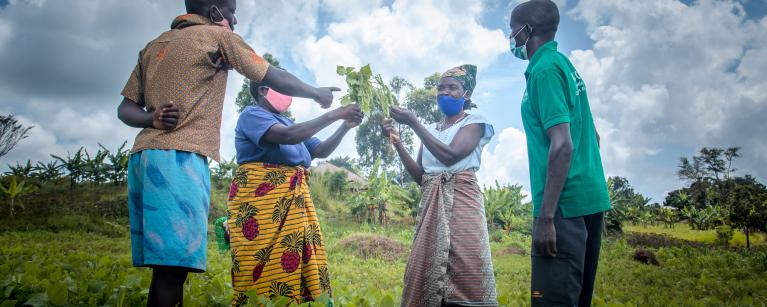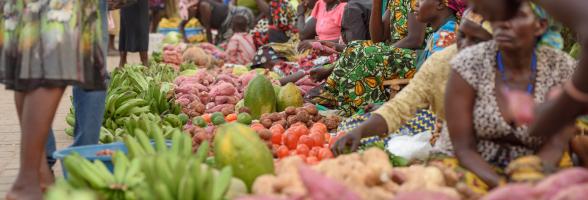Urebatriku Farmer Field School in Adjumani district began during the Covid- 19 pandemic. At the time many youths were idle and out of school as the government had postponed the school year as one of the Covid - 19 preventive measures.
The Farmer Field School (FFS) came at just the right time as a lifesaver and opportunity for youth to expend their energy.
Henry Anyama, a facilitator with Eastern and Southern Small Scale Farmers Forum (ESSAF) Uganda remarks that several youths have gotten immersed in the different farmer field groups. Their involvement is considered indispensable because of their youth and energy.
“Youth are very innovative,” Anyama says, “They are also very helpful when it comes to cultivating because they actively participate in doing all these activities; digging, harvesting, plucking fruits. You see, farmer field schools have a combination of members like the elderly and middle-aged so they need youths to carry out these hard-core duties.”
Youth in the district have benefited from the Farmer field schools because they have been able to learn a lot, especially in regard to understanding and appreciating the benefits of neglected and underutilised species.
For instance, in Urebatriku a 30-member FFS group the youth members picked an interest in the hibiscus plant being grown by the group and are willing to establish their own.
Hibiscus is a group of flowering plants in the mallow family, Malvaceae. The plant is known to have significant nutrients that can help boost the immune system and can help prevent cell damage.
While the plant's benefits were known and utilized in the past, certain varieties of the plant are endangered and underutilised due to habitat loss caused by human development, little knowledge among the youths about its benefits and competition from invasive plant species.
Urebatriku is reviving the plant along with other neglected and under-utilised plant species such as engoa (a type of simsim) and Lonjokobi another local food plant.
The farmer field school that was originally a SACCO in Adjumani district in Ofua Sub County set out to practice Pillar 3 on Neglected and Under-utilised Species.
They approached ESAFF Uganda and sought training on how to restore the plants with the overriding objectives of domesticating the varieties, and a possibility of seed multiplication because the plants are endangered and require seed for preservation.
The group also desired to re-cultivate plants that were economically viable because of their taste and attributes.
Amongst the three selected plants, the hibiscus specifically boomed because of its added value and many uses that are beyond usage for tea and soup, it can also be processed into wine.
According to the group chairperson, obtaining seeds was the biggest challenge that led to delay.
“We had to reach out to elderly relatives from afar who offered us directions on where to obtain the seed,” he noted.
After seeds were obtained, the group planted them following agronomic practices under the neglected and under- utilised Species.
“We have enough seeds for the next season and with time hope to cultivate the plants on bigger land in order to earn income,” the chairperson said.
Urebatriku, is also cultivating Lima, a bean variety that has been in existence for a while but is now on the verge of extinction. The difference between Lima beans and other bean varieties is that it is high yielding. For example, one Lima bean once dropped under a huge tree, will germinate, climb, grow and give high produce.
Youth in Urebatriku hope to transfer the knowledge obtained to increase their productivity as well as earn income to pay their school fees and improve their economic well-being.
The Farmer Field Schools were created under the Sowing Diversity Equals Harvesting Security (SD=HS) project which was implemented by the trio of ESSAF Uganda, Participatory Ecological and Land Use Management (PELUM) Uganda and Oxfam in Uganda with the aim of ensuring that farmers enjoy their rights and have the capacity to access, develop and improve their food and nutrition

